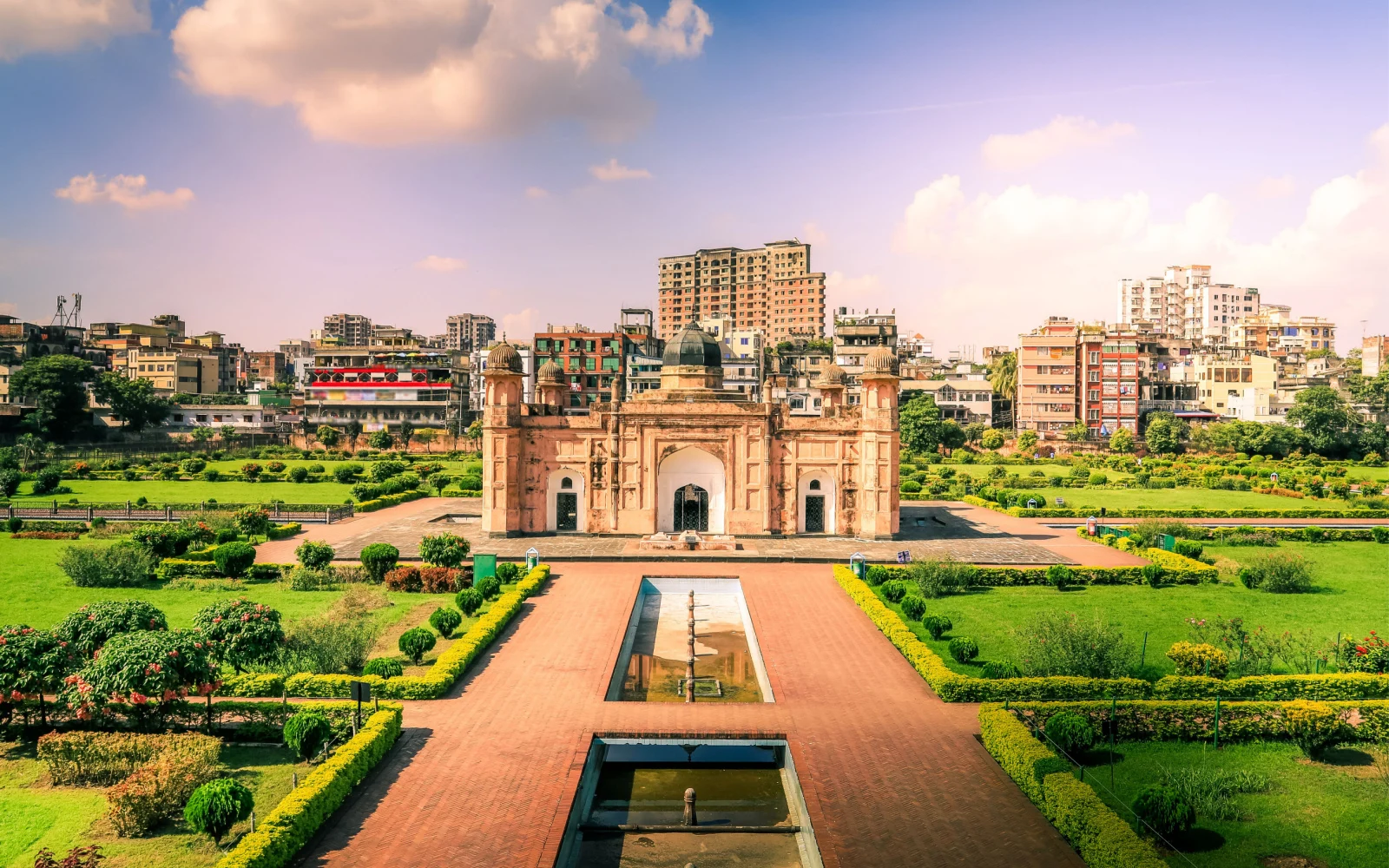Bangladesh is often overlooked by foreign visitors in favor of its larger neighbor India. The estimated 300,000 foreigners that do venture to the country every year are rewarded with sights few other international travelers have learned to appreciate.
It’s full of lush landscapes thanks to the many rivers that run through the country. Check out the beaches at Cox’s Bazar, or the green tea fields of Srimangal.
Bangladesh’s cities are full of cultural landmarks stretching back hundreds, if not thousands, of years, such as Dhaka with its Mughal forts or Chittagong with its many museums. Plus, you’ll get to experience the famous Bangladeshi cuisine and hospitality.
But while this storied country is rich in history, culture, and lush landscapes, is Bangladesh safe to visit? Here’s our expert opinion.
Is Bangladesh Safe to Visit in 2026?
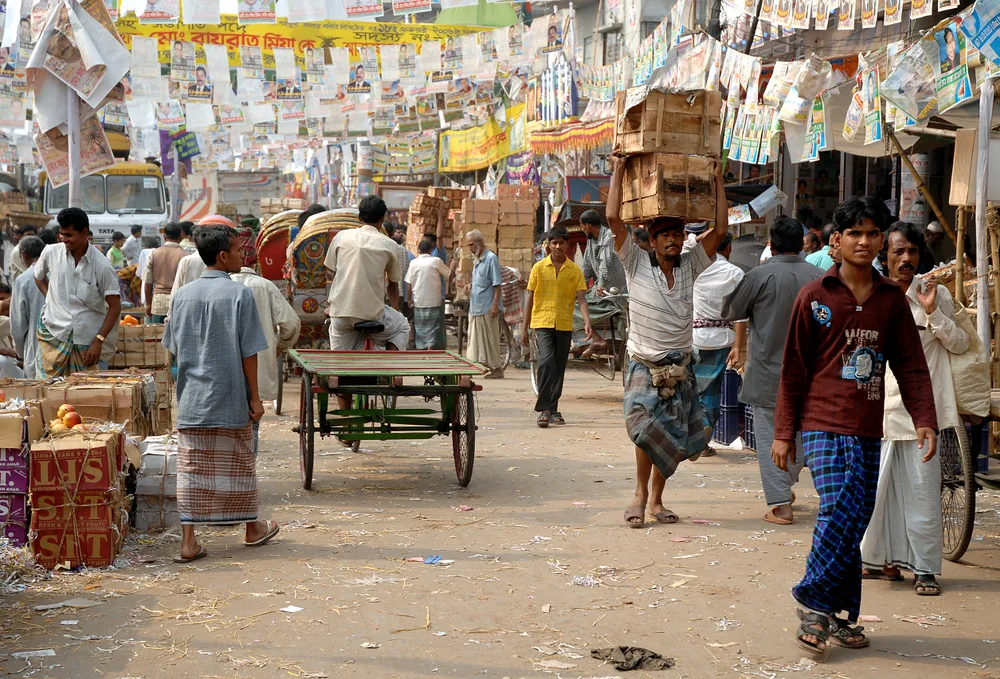
Dhaka / Bangladesh – Feb 13 2006: A busy street in the district of Sadarghat in Dhaka, Bangladesh. A bustling crowd in a road with small stores, banners and rickshaws. Local life, Dhaka, Bangladesh/Jono Photography/Shutterstock
Yes and no. Bangladesh is nominally a safe country to visit, but you will have to be on your guard as you travel here. Certain regions are not recommended for travel due to the uncertain security situation.
In the rest of the country, there is still an elevated risk of crime, including terrorism. Whenever you need information if it is safe to travel to another country, a good place to start your research is your government’s travel advisory for that country.
Many countries have elevated travel advisories in place for Bangladesh. For example, New Zealand advises its citizens to exercise increased caution throughout Bangladesh due to crime, terrorism, and general instability.
Civil and political unrest is common throughout Bangladesh as the country has had a tumultuous history and although the situation is mostly stable now, it is very tenuous.
The Canadian government warns that there are elections coming up in January 2024, so expect increasing demonstrations in the lead-up to the elections. Demonstrations, rallies, and strikes are frequent.
They often turn violent, both from the side of protesters who blockade streets and set off small explosive devices, and the government.
In December 2022, at least one person was killed when police clashed with protesters belonging to the opposition party. Pay attention to English language media ahead of time for announced protests, general strikes, and demonstrations.
If you notice a crowd forming, get away as soon as possible. Bangladesh also has elevated levels of crime, both violent and property crimes.
Common crimes include:
- Pickpocketing
- Bag snatching
- Mugging
- Armed robbery
- Sexual assault
- Kidnapping
- Terrorism
While most of this crime does not target foreigners, it is still very easy to get caught in the wrong place at the wrong time. You will need to use a lot of situational awareness to get around Bangladesh safely.
Besides being aware of crime and political violence in Bangladesh, remember the power of nature. Bangladesh has a tropical climate, and its rainy season is in the summer.
Monsoon season is from July to September, during which heavy rains and flooding may occur. Cyclone season, which happens from May to June and again from October to November, is more dangerous.
Cyclones are strong tropical storms with heavy winds and lots of rain that are often deadly. Avoid traveling to Bangladesh during cyclone season.
Crime in Bangladesh
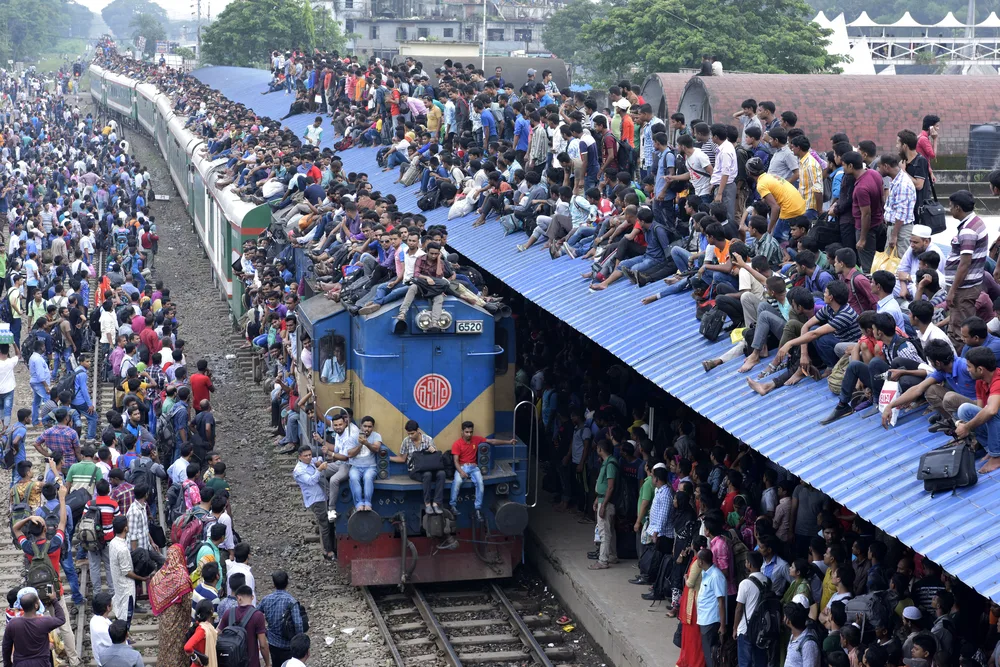
SK Hasan Ali/Shutterstock
Crime is one of the primary concerns for people visiting Bangladesh. The country overall has an elevated crime rate, and this is especially true for bigger cities such as Dhaka.
The homicide rate in Bangladesh is relatively low. In 2020, the homicide rate was 2.37 incidents per 100,000 people, which is fairly low and below the global average.
However, the rate of other violent crimes such as rape and armed robbery is high according to statistics and anecdotal evidence. Plus, many outside observers question the effectiveness of Bangladesh’s government in gathering homicide statistics.
According to Numbeo, Bangladesh has a high score on the site’s crime index, reaching a score of 69.48 out of 100. The most common crimes that respondents worried about included muggings, drug usage, and property crime.
Actual crime statistics are probably unreliable as public trust in the police is very low, with good reason. The most common crime people reported worrying about is corruption and bribery.
Many people perceive that Bangladesh’s crime is rising over the past few years. Local researchers are trying to uncover reasons for the increase in crime. Socioeconomic factors are some of the most important ones — according to the World Bank, 24.3% of people are under the national poverty line.
Poor economic prospects for many Bangladeshis makes crime tempting. Other factors behind the crime increase include high rates of drug abuse, inadequate education, and overall corruption.
It wouldn’t be right to talk about crime in Bangladesh without talking about the extremely high rate of gender-based violence, from sexual harassment to rape.
According to Equality Now, there were 6321 cases of rape in 2019, and over 1,000 of these cases happened to children. The actual incidence rate is probably much higher as many victims are scared to come forward.
The Bangladeshi legal system is stacked against survivors, as the law has an overly narrow definition of rape, judges often rule against victims if they have an “insufficient moral character,” and there are such high levels of corruption.
Most victims also face pressure from their community not to come forward. Although most incidents of sexual violence primarily affect local women, female visitors should be aware that Bangladeshi society is highly patriarchal.
Sexual harassment such as catcalling on the street and groping in public transportation is common.
There have been situations when foreigners were assaulted, particularly in rickshaws, taxis, and buses. Unfortunately, this is a concern that female travelers will have to keep in mind as they move around the country.
Robbery
The most common crime in Bangladesh is robbery, starting from petty theft escalating all the way to armed robbery. Petty theft crimes such as pickpocketing and bag snatching are very common in Bangladesh, especially in Dhaka.
The UK government warns its citizens that thieves often operate from the backs of motorcycles or in CNGs, types of motorized rickshaws with open sides. Be vigilant when walking alongside busy roads or in crowded areas.
Some basic precautions can make you less vulnerable to pickpocketing. Avoid actions that identify you as a potential target, such as wearing expensive jewelry or waving around your smartphone.
Make sure that you have a secure travel bag with a zipper that you can hold close to your body. Make copies of all of your documents and make sure that they are secure.
Don’t let down your guard, even in places where you might expect to feel safe such as hotel lobbies, restaurants, and even the airport. Petty theft is a prevalent problem, but it is not the most dangerous form of robbery.
Unfortunately, armed robbery and mugging are also common crimes, especially in Dhaka. Many of these robberies happen at night, so avoid leaving your accommodation too late after dark.
If you are robbed, hand over your valuables and focus on getting away safely. Many robbers are part of criminal gangs and will not take kindly to resistance. If it is any comfort, you are not in any additional danger of robbery because you are a foreigner, unlike in some other places.
The U.S. State Department explains that most robberies are situational, not targeted. If you can reduce your risk of being in the wrong place at the wrong time, you can also reduce your risk of being the victim of a major crime.
Terrorism
There is an elevated risk of terrorism in Bangladesh. There were several low-scale terrorist attacks in Bangladesh between 2018 and 2020, and even more were reportedly foiled by the government in the last stages of their development.
Although no foreigners have been targeted or killed by these activities in the past few years, terrorist groups such as ISIL and AQIS are open about their desire to carry out more attacks in Bangladesh.
So far, most targets in terrorist attacks have been government buildings, individual assassinations of prominent activists, and minority religious groups. A few years ago, there were also attacks on places where foreigners congregate, such as a café in Dhaka and the international airport.
These types of targets are likely to come on the radar of terrorists again, even if there haven’t been any attacks directed at foreigners in the past three or four years.
There is no way to really avoid being the victim of a terrorist attack because it is by definition a crime based on random violence. You can take some precautions that might make you feel safer.
Read the news before and during your trip to Bangladesh to see if authorities are issuing any alerts. Avoid very crowded places such as minority religious festivals that are likely terrorist targets. If an attack does happen, then follow the instructions of authorities closely.
Avoiding Bad Areas
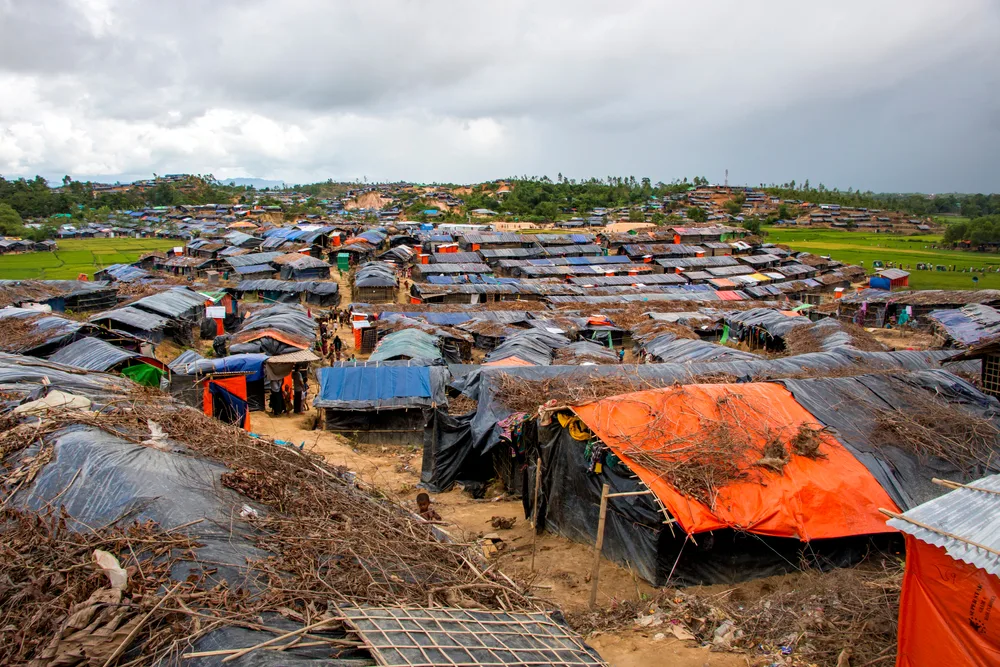
Huseyinktk/Shutterstock
There are certain areas of Bangladesh where it is not safe to travel. Most governments advise their citizens not to travel to the Chittagong Hill Tracts in the southeast of Bangladesh.
This region is the sight of an ongoing conflict between indigenous locals and the national government, dating back to the 1970s. There is a much higher threat of kidnapping, terrorism, and general crime in the area.
Cox’s Bazar in the south is a popular destination because of its beaches, but it is now home to large refugee camps housing Rohingya people who fled from Myanmar. Avoid these refugee camps unless you are going in an official capacity as they are not safe for visitors.
Dhaka is a big city, so of course it has some areas that are more dangerous. Places locals flag as unsafe include Narayanganj, Mirpur, and Maghbazar. However, crime can and will occur anywhere in the city.
Things to Consider
Here are some other things to consider before traveling to Bangladesh:
- Traffic in Bangladesh is very dangerous, and drivers don’t care much about traffic laws. Don’t rent a car yourself and be careful which public transportation you take — rickshaws have very little safety in case of an accident.
- Checkpoints are common, so always have at least a copy of your ID on you.
- Bangladesh is a Muslim country with a conservative culture, so keep that in mind and dress accordingly.
- The infrastructure is probably worse than what you are used to, so be prepared for frequent power outages and water cuts.
Frequently Asked Questions
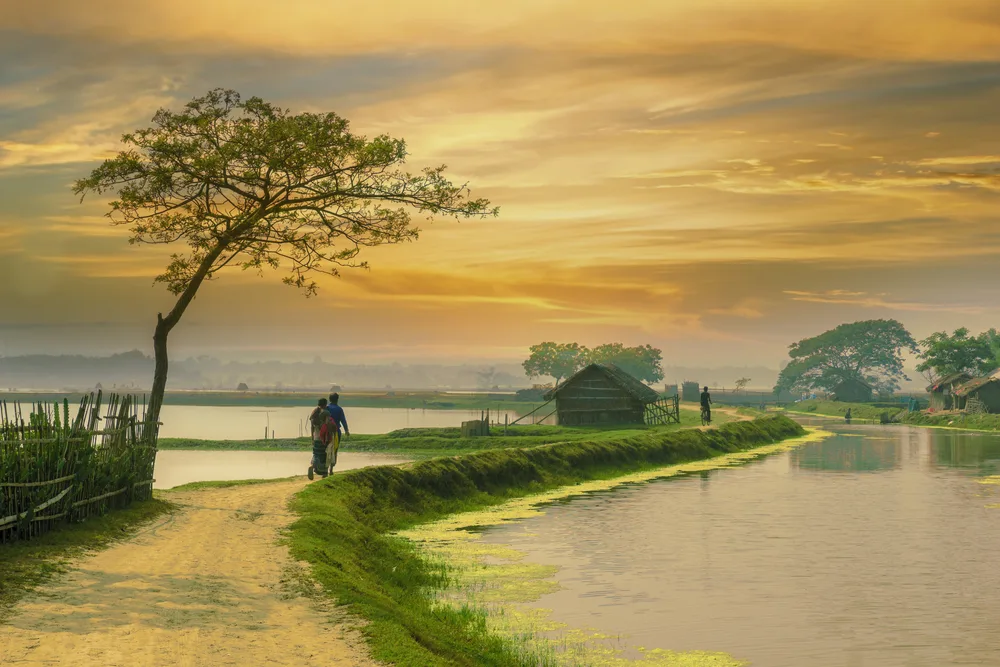
Arlo Magicman/Shutterstock
Here are some common questions people asked before visiting Bangladesh:
Are tourists safe in Bangladesh?
Tourists in Bangladesh are in no greater danger than locals since most crime is situational, not targeted. However, you will find that tourist-related infrastructure, such as resorts or designated tourism police, are not present in Bangladesh.
Is Bangladesh safe for females?
Bangladesh is not the safest place in the world for female travelers, especially those traveling alone. Women receive a lot of unwanted attention in the street, including foreign women. However, experienced female travelers have had great times visiting Bangladesh.
Why do foreigners visit Bangladesh?
Not many foreigners visit Bangladesh, but those that do don’t regret it. Adventurous travelers come to Bangladesh to check out archeological sites, beautiful landscapes, and unique culture, plus to brag to people back home that they took a risk, and it was worth it.
How can we be safe in Bangladesh?
If you are traveling as a group, make sure that your group sticks together when you visit Bangladesh. Don’t bring flashy clothes or lots of cash as that makes you a likely target for thieves. Take reputable taxis instead of sketchy public transportation and rickshaws.
Can you drink alcohol in Bangladesh?
Alcohol sales are very strictly regulated in Bangladesh due to religious reasons. It is only legal for non-citizens and non-Muslims, while Bangladeshi Muslims need a special permit to drink.
You can only drink alcohol in licensed bars. Although there is an underground trade, it is illegal, so it is better to avoid getting involved in it.
So, Should You Travel to Bangladesh?
Bangladesh is mostly safe to visit, but it is not the most comfortable trip. You will have to exercise precautions such as keeping a very firm grasp on your valuables and monitoring the news to look at the possibility of civil unrest or terrorism. Happy travels!



